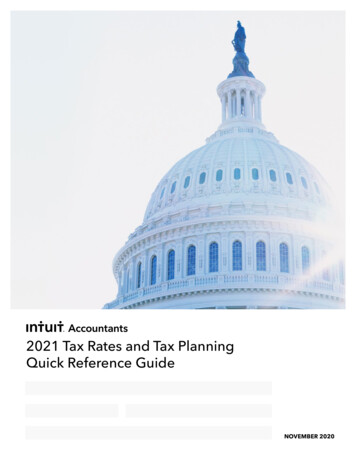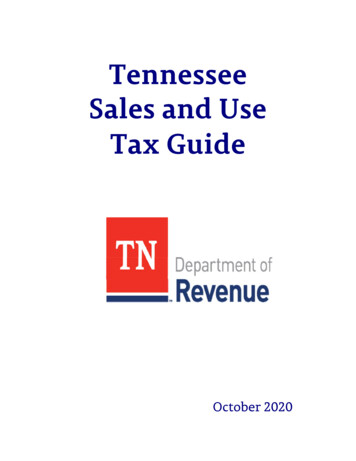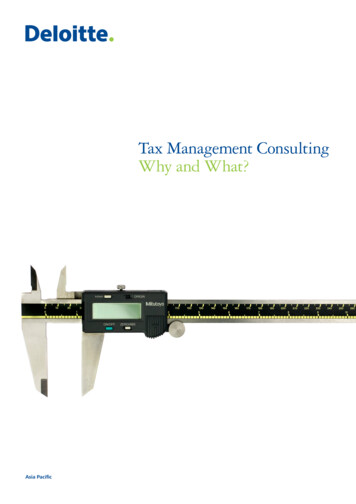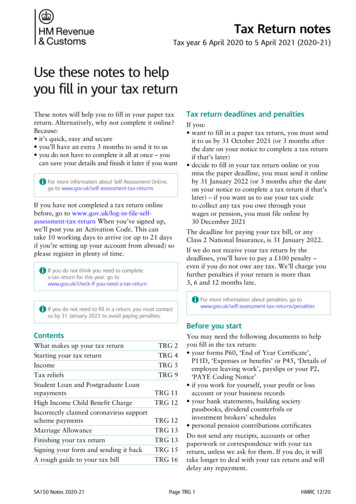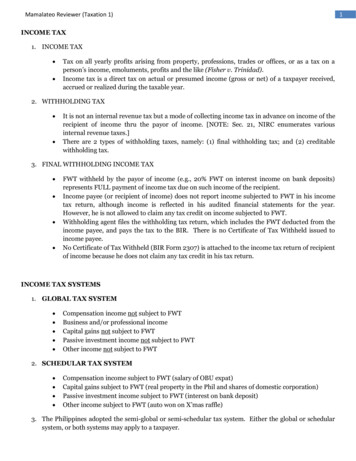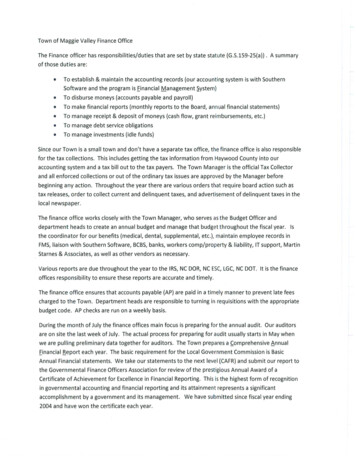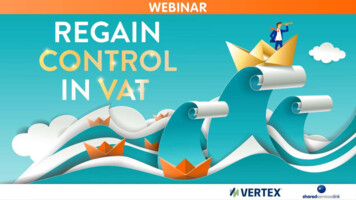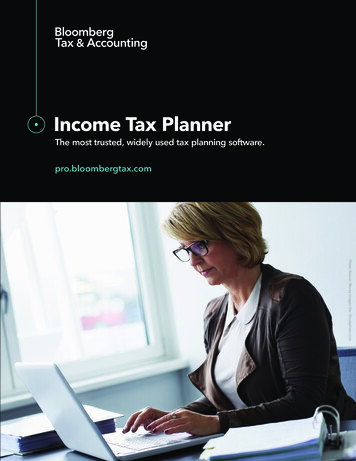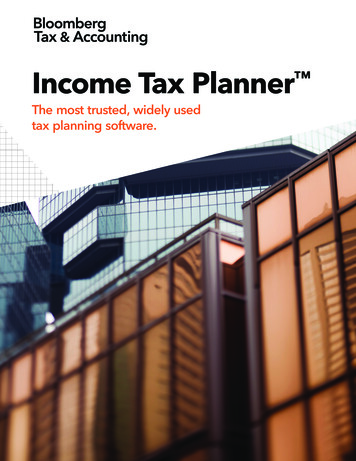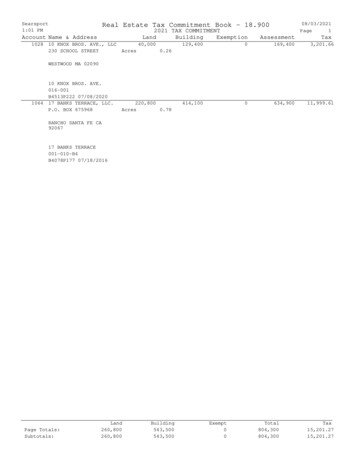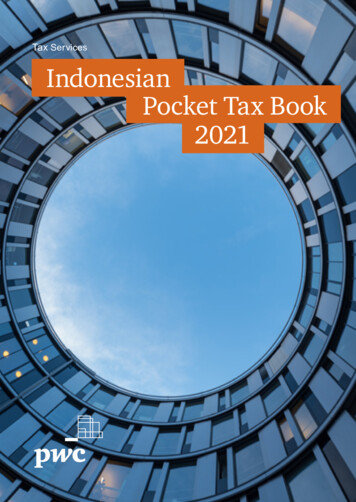
Transcription
Tax ServicesIndonesianPocket Tax Book2021
ContentsCorporate Income TaxTax rates; Tax residence; Tax payments; Business profits; Taxationon certain offshore income; Controlled foreign companies; Capitalallowances; Disallowed deductions; Debt to Equity Ratio; Losses;Profit distributions; Deemed profit margins; Special industries andactivities; Transfer Pricing; Income Tax on e-commerce and ElectronicTransaction Tax1Individual Income TaxNormal tax rates; Concessional tax rates; Main Personal Relief; Taxresidence; Registration and filing; Tax payments; Benefits-in-kind (BIKs);Social security system17Withholding TaxesGeneral; Articles 21, 22, 4(2), 23 and 26 income taxes26International Tax AgreementsDouble Taxation Agreements; Tax Information Exchange Agreements;Mutual Administrative Assistance in Tax Matters; Multilateral Instrument;US FATCA35Value Added TaxGeneral; VAT on e-commerce; VAT exemption facilities; VAT not-collectedfacilities47Luxury-goods Sales Tax60Customs and ExciseImport Duty; Export Duty; Excise62Tax ConcessionsIncome tax concessions; LST concession; Concessions on special projectsand special zones67Land and BuildingLand and Building Tax; Tax on land and building transfer;Duty on the acquisition of land and building rights80Stamp Duty84Tax Payments and Tax Return FilingMonthly tax obligations, Annual tax obligations, Early tax refunds85Accounting for Tax91Tax Audits and Tax Assessments93Tax Collection Using Distress Warrant99Tax Dispute and ResolutionObjections; Appeals; Other avenues for tax dispute resolution;Judicial Review Requests to the Supreme Court101Contacts105
Corporate Income TaxCorporate Income TaxTax ratesGenerally a flat rate of 22% applies for fiscal year 2021 andreduced to 20% starting fiscal year 2022. Public companiesthat satisfy a minimum listing requirement of 40% and otherconditions are entitled to a tax cut of 3% off the standard rate,giving them an effective tax rate of 19% for fiscal year 2021and 17% for fiscal year 2022 onwards (refer to page 69). Smallenterprises, i.e. corporate taxpayers with an annual turnoverof not more than Rp 50 billion, are entitled to a 50% discountof the standard tax rate which is imposed proportionally ontaxable income of the part of gross turnover up to Rp 4.8billion. Certain enterprises with gross turnover of not morethan Rp 4.8 billion are subject to Final Tax at 0.5% of turnover.Tax residenceA company is treated as a resident of Indonesia fortax purposes by virtue of having its incorporation or itsdomicile is in Indonesia. A foreign company carrying outbusiness activities through a permanent establishment (PE)in Indonesia will generally have to assume the same taxobligations as a resident taxpayer.PwC IndonesiaIndonesian Pocket Tax Book 20211
Corporate Income TaxTax paymentsResident taxpayers and Indonesian PEs of foreigncompanies have to settle their tax liabilities either by directpayments, third party withholdings, or a combination ofboth. Foreign companies without a PE in Indonesia have tosettle their tax liabilities for their Indonesian-sourced incomethrough withholding of the tax by the Indonesian partypaying the income.Monthly tax instalments (Article 25 income tax) constitute thefirst part of tax payments to be made by resident taxpayersand Indonesian PEs as a prepayment of their current yearCorporate Income Tax (CIT) liability. A monthly tax instalmentis generally calculated using the most recent CorporateIncome Tax Return (CITR). Special instalment calculationsapply for new taxpayers, finance lease companies, banks,state-owned companies, listed companies and othertaxpayers with periodical reporting requirements.The tax withheld by third parties on certain income (Article 23income tax) or tax to be paid in advance on certaintransactions (e.g., Article 22 income tax on imports) alsoconstitute prepayments for the current year CIT liability of theincome recipient or the party conducting the import (refer topages 32-33 for income items subject to Article 23 incometax and pages 26-30 for transactions subject to Article 22income tax).2Indonesian Pocket Tax Book 2021PwC Indonesia
Corporate Income TaxIf the total amount of tax paid in advance through the year(Articles 22, 23, and 25 income taxes) and the tax paidabroad (Article 24 income tax) is less than the total CIT due,the taxpayer has to settle the shortfall before filing its CITR.Such a payment is referred to as Article 29 income tax.Certain types of income earned by resident taxpayersor Indonesian PEs are subject to final income tax. In thisrespect, the tax withheld by third parties (referred to asArticle 4(2) income tax) constitutes the final settlement of theincome tax for that particular income (refer to pages 31-32for income items subject to final income tax under Article4(2) income tax).For foreign companies without a PE in Indonesia, thetax withheld from their Indonesia-sourced income by theIndonesian party paying the income (Article 26 incometax) constitutes a final settlement of their income tax due(refer to pages 33-34 for income items subject to Article 26income tax).Business profitsTaxable business profits are calculated on the basis ofnormal accounting principles as modified by certaintax adjustments. Generally, a deduction is allowed forall expenditure incurred to obtain, collect and maintaintaxable business profits. A timing difference may arise if anexpenditure recorded as an expense for accounting cannotbe immediately claimed as a deduction for tax.PwC IndonesiaIndonesian Pocket Tax Book 20213
Corporate Income TaxTaxation on certain offshore incomeIndonesian tax residents are generally taxed on a worldwideincome basis. However, the following offshore income maybe exempted from income tax if it is reinvested or used forbusiness activities in Indonesia within a certain period: Income received by an Indonesian taxpayer from a PEabroad; Dividends paid by companies abroad; and Active business income received by an Indonesiantaxpayer from abroad (not from a PE or foreignsubsidiary).For the first two categories above, the minimumreinvestment amount is 30% of the profit after tax. If theafter-tax income from the PE and dividend paid from thenon-listed subsidiary are reinvested in Indonesia is lessthan 30% of profit after tax, the difference between the30% threshold and the reinvested portion will be subject toincome tax.Controlled foreign companiesCertain income of a Controlled Foreign Companies (CFCs)are subject to deemed dividend rules in Indonesia. Thisincome includes dividends, interest, rentals, royalties,and gains from sales or transfer of assets, with certainlimitations. A CFC is a foreign entity that is at least50% owned by an Indonesian taxpayer or at least 50%collectively owned by Indonesian taxpayers. The scopeof CFC income also covers income from indirectly owned4Indonesian Pocket Tax Book 2021PwC Indonesia
Corporate Income TaxCFC with a minimum of 50% ownership by another CFC, orcollective ownership by an Indonesian taxpayer’s CFCs, orcollective ownership by a number of CFCs (including underthe same or different Indonesian taxpayers).The ownership threshold that is used to determine theCFC status is the ownership percentage at the end of theIndonesian taxpayer’s fiscal year, which is based on eitherthe percentage of paid-up capital or the percentage paid-upcapital with voting rights. The only situation in which therules do not apply is when the CFC’s shares are listed on astock exchange.Capital allowancesDepreciationExpenditure incurred in relation to assets with a beneficiallife of more than one year are categorized and depreciatedfrom the month of acquisition by the consistent use of eitherthe straight-line or the declining-balance method.TangibleAssetsCategoriesDepreciation rateUseful LifeStraight linemethodDecliningbalancemethodCategory 14 years25%50%Category 28 years12.5%25%I. Non-buildingPwC IndonesiaIndonesian Pocket Tax Book 20215
Corporate Income TaxTangibleAssetsCategoriesDepreciation rateUseful LifeStraight linemethodDecliningbalancemethodCategory 316 years6.25%12.5%Category 420 years5%10%II. BuildingPermanent20 years5%Non-permanent10 years10%The comprehensive lists of the assets included in each categoryare set out in certain Minister of Finance (MoF) regulations.Special rules apply to assets used for certain industries (i.e. oiland gas, forestry, plantation and cattle breeding).AmortisationIntangible property or costs, including the cost of extendingbuilding use rights, rights for business use, rights for useand goodwill with a useful life of more than one year, shouldbe amortised on the following bases, as appropriate:a.6Using the straight line or the declining balance methodat the rates specified in categories 1, 2, 3, and 4 underDepreciation (above) based on the useful life of theproperty that is applicable for: general intangible assets; the costs of incorporation and expansion of thecapital of an enterprise; andIndonesian Pocket Tax Book 2021PwC Indonesia
Corporate Income Tax the capitalised costs incurred before thecommencement of commercial operations,with a useful life of longer than one year. Classificationinto the appropriate category is determined on the basisof the nearest useful life.b.Using the production unit method on costs incurredin the acquisition of the right to oil and natural gasconcessions, mining rights, forest concessions, andother rights to exploit natural resources and naturalproducts with a beneficial life of longer than one year.Other than for oil and natural gas concessions, theamortisation may not exceed 20% per annum.Assets arising from Tax Amnesty programIndonesia has rolled out Tax Amnesty program from 1 July2016 to 31 March 2017 and any newly declared assetsunder this program cannot be depreciated or amortisedfor tax purposes. The acquisition costs of these assets arebased on the value declared in the Tax Amnesty DeclarationLetter.Asset transfersSales of a company’s assets (other than land and building)may result in capital gains or losses, calculated as thedifference between the sales proceeds and the taxwrittendown value of the assets concerned. Capital gainsare assessable whilst a capital loss is tax-deductible only ifthe asset concerned is used in the running of the business,PwC IndonesiaIndonesian Pocket Tax Book 20217
Corporate Income Taxi.e., for obtaining, collecting, and securing assessableincome.Revaluation of fixed assetsSubject to the Director General of Tax (DGT) approval,corporate taxpayers and PEs who maintain rupiahaccounting may undertake a revaluation of their noncurrenttangible assets for tax purposes. This may be carried outonce every five years. Each revaluation must include allbusiness-related assets which are owned by the companyand located in Indonesia, except for land (this may beomitted). Before requesting the DGT’s approval, thecompany concerned must determine that it has settled all ofits outstanding tax liabilities.The revaluation must be conducted on a market or fairvalue basis. The market values must be determined bya Government-approved appraiser. These are subject toDGT adjustments if the values, in the DGT’s view, do notrepresent the fair or market values of the assets.Once approved, the depreciation applied to depreciableassets must be based on the new tax book values(approved values) on the basis of a full useful life (in otherwords, as if the assets were new).The excess of the fair market value over the old tax bookvalue of the revalued assets is subject to final income taxat a rate of 10%. Subject to the DGT approval, taxpayers8Indonesian Pocket Tax Book 2021PwC Indonesia
Corporate Income Taxfacing financial difficulties may pay this tax in instalmentsover 12 months.Fixed assets falling under categories 1 and 2 must beretained at least to the end of their useful life. Land,buildings, and assets falling under categories 3 and 4 mustbe retained for at least 10 years after the revaluation date.Additional final income tax at a rate of 10% is imposed onthe original revaluation gains if the revalued assets are soldor transferred before the end of this minimum retentionperiod. This does not apply to:a. Transfer of assets because of force majeur or based ona Government decision/policy or a court decision;b. Transferred in the course of a tax-neutral businessmerger, consolidation, or business split;c. Withdrawal of fixed assets of a company because ofirreparable damage.Disallowed deductionsThese include:a. Benefits-in-kind (BIKs) (e.g., free housing, 50% of theacquisition and maintenance costs of certain companyprovided cars), except food and drink provided toall employees, employee benefits required for jobperformance such as protective clothing and uniforms,transportation costs to and from the place of work,accommodation for ship crew and the likes, the costof providing BIKs in remote areas, and 50% of theacquisition and maintenance costs of cellular phones;PwC IndonesiaIndonesian Pocket Tax Book 20219
Corporate Income Taxb.c.d.e.f.g.h.i.j.k.10Private expenses;Non-business gifts and aid, except certain religiouscontributions/alms and certain donations;Provisions, except for: provision for doubtful accountsfor banking and certain financial institutions, provisionfor insurance companies, deposit security provision forthe Deposit Insurance Corporation (Lembaga PenjaminSimpanan/LPS), reclamation provision for miningcompanies, forestation provision for forestrycompanies, and area closure and maintenanceprovision for industrial waste processing businesses;Income tax payments;Tax penalties;Profit distributions;Employer contributions for life, health and accidentinsurance and contributions to unapproved pensionfunds, unless the contributions are treated as part ofthe taxable income of employees;Expenses relating to income which is taxed at a finalrate, e.g., interest on loans relating to time deposits;Expenses relating to income which is exempt fromtax, e.g., interest on loans used to buy shares wheredividends to be received are not subject to income tax;Salaries or compensation received by partnership orfirmas members where their participation is not dividedinto shares.Indonesian Pocket Tax Book 2021PwC Indonesia
Corporate Income TaxDebt to Equity RatioA single ratio of 4:1 is generally applicable, which means theamount of debt allowable in order to obtain full deductibilityof the financing cost is limited to four times the equityamount. Exemption applies to certain taxpayers.LossesLosses may be carried forward for a maximum of five years.However, for a limited category of businesses in certainregions or businesses subject to certain concessions, theperiod can be extended for up to 10 years. The carryingback of losses is not allowed. Tax consolidation and grouprelief is not available.Profit distributionsTax is liable to be withheld from dividends as follows:a. Resident recipientsDividend received from an Indonesian company is nontax object if it is received or earned by: Resident individual taxpayers who reinvest it inIndonesia within certain period; and/or Resident corporate taxpayers.Dividends received by resident individual taxpayers whodid not meet the reinvestment requirement, are subjectto final income tax at a maximum rate of 10%.PwC IndonesiaIndonesian Pocket Tax Book 202111
Corporate Income Taxb.Non-resident recipients:20% (lower for treaty countries) final withholding tax isdue on dividends paid to a non-resident recipient.Deemed profit marginsThe following businesses have deemed profit margins fortax purposes:DeemedProfit inGrossRevenueEffectiveIncome TaxRateDomestic shipping operations4%1.20% 1Domestic airline operations6%1.80% 1Foreign shipping and airlineoperations6%2.64% 1Foreign oil and gas drilling operations15%3.75% 21% of exportvalue0.25% 2Certain Ministry of Traderepresentative officesNotes:1The effective income tax rate (eitr) is calculated using the old tax rateof 30% because the MoF has not revised the decrees which regulate thedeemed profit margins.212The eitr is calculated using the current tax rate of 25%, excluding BranchProfit Tax (BPT) portion. BPT rate varies according to availability of areduced rate based on tax treaties.Indonesian Pocket Tax Book 2021PwC Indonesia
Corporate Income TaxSpecial industries and activitiesCertain contractually based concessions are available inIndonesia. These include Production Sharing Contracts(PSCs), Contract of Works (CoWs) and Mining BusinessLicenses (Izin Usaha Pertambangan/IUP).Companies engaged in upstream oil and gas typically haveto calculate CIT in accordance with their PSCs. The PSCscan be “conventional” with CIT effectively based on costrecovery principles or “gross split” which more closelyfollow the general CIT rules.Certain companies engaged in metal, mineral and coalmining are governed by CoWs for the CIT calculation.Different provisions may apply including in respect of CITrates, deductible expenses and how taxable income iscalculated. CoW arrangements are however no longeravailable under the 2009 Mining Law and recent miningwill generally follow an IUP concession. The Mining Lawstipulates that general prevailing tax laws/regulations applyto these mining projects. Specific tax regulations howeveralso exist for non-coal mining IUPs.Transfer PricingThe Income Tax Law defines related parties as:a. Taxpayer has capital participation directly or indirectlyat least 25% upon another Taxpayers; the relationshipbetween Taxpayers through ownership at least 25%PwC IndonesiaIndonesian Pocket Tax Book 202113
Corporate Income Taxb.c.upon two or more Taxpayers; or relationship betweentwo or more Taxpayers mentioned later;Taxpayer controls the other Taxpayer or two or moreTaxpayers are under the same control, either directly orindirectly; orThere are family relationship either blood relationship orby marriage in vertical and/or horizontal lineage of onedegree.Transactions between related parties must be consistentwith the arm’s length principle. If the arm’s length principleis not followed, the DGT is authorised to recalculate thetaxable income or deductible costs arising from suchtransactions applying the arm’s length principle.Under the General Tax Provisions and Procedures(Ketentuan Umum dan Tata Cara Perpajakan/KUP)Law, the Government requires specific transfer pricingdocumentation to prove the arm’s length nature of relatedparty transactions.The MoF issued a new regulation dated 30 December 2016regarding transfer pricing documentation which requirestaxpayers under certain criteria to prepare transfer pricingdocumentation, namely: Master file, Local file, and Countryby-Country Report (CbCR). The Master file and Localfile must be available if requested by the DGT, while thesummary must be attached to the Corporate Income TaxReturn (CITR) of the tax year concerned. The Notification of14Indonesian Pocket Tax Book 2021PwC Indonesia
Corporate Income Taxthe CbCR obligation and the CbCR itself (if required) mustbe submitted to the tax office within 12 months after the endof a tax year.Detailed transfer pricing disclosures are required in theCITR. These include: The nature and value of transactions with related parties; The transfer pricing methods applied to thosetransactions and the rationale for selecting themethods; and Whether the company has prepared transfer pricingdocumentation.ITO provides specific technical guidelines to carry outtransfer pricing audits.Transfer pricing disputes may be resolved through thedomestic objection and appeal process or, where the disputeinvolves a transaction with a related party in a country that isone of Indonesia’s tax treaty partners, the parties may requestdouble tax relief under the Mutual Agreement Procedures(MAP) article of the relevant tax treaty. MAP may be appliedconcurrently with a domestic dispute resolution process.However, the MAP will result to a disagreement once thedecision on the tax appeal case has been pronounced.The tax law authorises the DGT to enter into AdvancePricing Agreements (APAs) with taxpayers and/or anothercountry’s tax authority on the future application of the arm’sPwC IndonesiaIndonesian Pocket Tax Book 202115
Corporate Income Taxlength principle to transactions between related parties.APA’s conclusions may potentially be rolled back to openyears, albeit on a limited basis. In all cases, the APA periodcan be up to maximum of five years.Income Tax on e-commerce and ElectronicTransaction TaxForeign e-commerce players with a significant economicpresence in Indonesia can be deemed as having aPermanent Establishment (PE) in Indonesia. If a PE cannotbe deemed to exist under the existing rules of an applicableTax Treaty, affected e-commerce players will be subject toan Electronic Transaction Tax (ETT). ETT will be imposed ondirect sales or sales through the marketplace.The PE with significant economic presence will bedetermined based on the following factors: consolidated gross turnover of group businesses; revenue from Indonesian market; or number of active userswithin certain thresholds that will be governed by the MoF.Details on the tax rate, tax base, and calculation methodwill be governed in a Government Regulation (GR), whilethe payment and reporting mechanism will be governed byfurther implementing regulations.16Indonesian Pocket Tax Book 2021PwC Indonesia
Individual Income TaxIndividual Income TaxNormal tax ratesMost income earned by individual tax residents is subject toincome tax at the following normal tax rates:Taxable IncomeRateUp to Rp 50,000,000Tax Rp.5%2,500,000Above Rp 50,000,000 up toRp 250,000,00015%30,000,000Above Rp 250,000,000 up toRp 500,000,00025%62,500,00030%30% of therelevant amountAbove Rp 500,000,000Concessional tax ratesThe final tax rates for severance payments (if paid within twoyears) are as follows:Gross IncomeRateTax Rp.Up to Rp 50,000,000NilNilAbove Rp 50,000,000 up toRp 100,000,0005%2,500,000PwC IndonesiaIndonesian Pocket Tax Book 202117
Individual Income TaxGross IncomeRateTax Rp.Above Rp 100,000,000 up toRp 500,000,00015%60,000,000Above Rp 500,000,00025%25% of the relevantamountThe final tax rates for lump-sum pension payments from aGovernment-approved pension fund, old-age securitysaving payments from Badan Penyelenggara Jaminan Sosial(BPJS) Ketenagakerjaan (workers’ social security program) ifpaid within two years are as follows:Gross IncomeRateTax Rp.Up to Rp 50,000,000NilNilAbove Rp 50,000,0005%5% of the relevantamountPayments for year 3 onwards, the usual normal tax rates(please refer to page 17) will be applied.18Indonesian Pocket Tax Book 2021PwC Indonesia
Individual Income TaxMain Personal ReliefAnnual non-taxable income (Penghasilan Tidak Kena Pajak/PTKP) for resident individuals is as follows:Rp.Taxpayer54,000,000Spouse4,500,000Each dependant (max. of 3)4,500,000Occupational expenses (5% of gross income, max.Rp. 500,000/month)6,000,000Employee contribution to BPJS Ketenagakerjaan forold age security savings (2% of gross income)Pension maintenance expenses (5% of gross income,max. Rp 200,000/month)Full amount2,400,000Tax residenceAn individual is regarded as a tax resident if he/she fulfilsany of the following conditions: He/she resides in Indonesia; He/she is present in Indonesia for more than 183 daysin any 12-month period; He/she is present in Indonesia during a fiscal year andintends to reside in Indonesia.Note: The provisions of tax treaties may override these rules.PwC IndonesiaIndonesian Pocket Tax Book 202119
Individual Income TaxIndonesian tax residents are generally taxed on aworldwide income basis. However, foreign citizens maybe taxed only on their Indonesian-sourced income fora limited period if they fulfill certain requirements. Inaddition, there are certain overseas income that are notsubject to tax in Indonesia (see page 4 on Taxation oncertain offshore income).An Indonesian citizen who is present in Indonesia for lessthan 183 days in any 12-month period may be consideredas a non-resident if they fulfill additional requirements, forexample having a permanent home, centre of vital interest,habitual abode, the status of tax subject, or other criteriaoutside Indonesia.Non-resident individuals are subject to withholding tax ata rate of 20% (Article 26 income tax, subject to a relevanttax treaty provisions) on Indonesia-sourced income (asspecified on pages 33-34).Registration and filingResident individual taxpayers who receive or earn annualincome exceeding the PTKP threshold must register withthe ITO and file annual income tax returns (Form 1770).The tax return should disclose all the individual’s income,including compensation from employment, investmentincome, capital gains, overseas income and other income,as well as providing a summary of the individual’s assetsand liabilities. An Indonesian shareholder in a CFC is20Indonesian Pocket Tax Book 2021PwC Indonesia
Individual Income Taxdeemed to receive a dividend with respect to the CFCincome. Please refer to pages 4-5 regarding CFCs.A family is generally regarded as a single tax reporting unitwith a single tax identity number (Nomor Pokok Wajib Pajak/NPWP) in the name of the head of the family (typically thehusband). His wife and his dependant children’s incomemust be reported on the same tax return in his name;they may or may not be taxed together with his incomedepending on whether their income is subject to Article 21income tax.Tax paymentsA substantial part of individual income tax is collectedthrough withholding by third parties. Employers are requiredto withhold Article 21/26 income tax on a monthly basisfrom the salaries and other compensation payable to theiremployees. If an employee is a resident taxpayer, theamount of tax withheld should be based on the normal taxrates (as set out above). If he/she is a non-resident taxpayer,the withholding tax is 20% of the gross amount (and may beset at a lower rate under a tax treaty).Various other payments to individuals also call forwithholding tax obligations from the payers. These include,among others: Pension payments made by Government-approvedpension funds; Severance payments;PwC IndonesiaIndonesian Pocket Tax Book 202121
Individual Income Tax Old-age security saving payments from BPJSKetenagakerjaan;Fees for services;Prizes/awards.Typically the amount of tax withheld from these types ofincome (Article 21 income tax) is based on normal tax ratesas set out above.The tax withheld on fees for non-employee individualsand certain professionals, such as lawyers, notaries,accountants, architects, doctors, actuaries and appraisers,are required to be calculated based on 50% of the grossincome at the prevailing rates.Interest earned on severance payments transferred to amanpower severance pay management board is subjectto a final tax of 20% if the board is a bank, or to a 15%withholding tax under Article 23 income tax in other cases.Benefits-in-kind (BIKs)BIKs, such as cars, housing, education, home leave andreimbursement of an employee’s Indonesian tax liabilityprovided by the employer, are typically not assessable in thehands of the employee. This also applies to BIKs which arerequired for the execution of a job, for example protectiveclothing, uniforms, transportation costs to and from theplace of work and accommodation for ship crew and thelikes, and the cost of providing BIKs in remote areas.22Indonesian Pocket Tax Book 2021PwC Indonesia
Individual Income TaxHowever, BIKs are taxable in the hands of the employee ifthey are provided by: Final-taxed companies; and Companies taxed at a deemed-profit (includes airlineand shipping companies).Some other taxpayers may also have specific tax treatmentregarding the taxability of BIKs.Social security systemEmployers are responsible for ensuring that their employeesare covered by a social security program. Employees’contributions are collected by the employers throughpayroll deductions. These must be paid together with theemployer’s contributions.From 1 January 2014, a comprehensive social securityprogram covers all Indonesian citizens is in place. The socialsecurity system is administered by:1. Social Security Agency for health insurance (BPJSKesehatan) - covering health insurance2. Social Security Agency for worker’s social security(BJPS Ketenagakerjaan) - covering accidents,insurance, old age savings, death insurance andpensionsPwC IndonesiaIndonesian Pocket Tax Book 202123
Individual Income TaxThe current premium contributions are as follows:Areas coveredAs a percentage of regularsalaries/wagesBorne byemployersBorne byemployees0.24-1.74%-Death insurance0.3%-Old age savings3.7%2%Health care*4%1%Pension**2%1%Working accident protection*) Maximum calculation base is Rp 12,000,000/month**) Maximum calculation base is updated annualy based on BPJS regulationThe compulsory requirement to join the new socialsecurity scheme applies to all employees, includingexpatriates who have been working in Indonesia for morethan six months.Saving Management of People’s HousingSaving management of people’s housing (TabunganPerumahan Rakyat/Tapera) is a mechanism to collectand provide a long-term, sustainable low-cost funds forhouse financing in order to meet the needs of decent andaffordable housing for the participants. The implementationof the Tapera Program is intended for all segments ofworkers on the principle of mutual cooperation.24Indonesian Pocket Tax Book 2021PwC Indonesia
Individual Income TaxDeposits contributions are paid by employees andemployers based on a certain percentage of wages i.e.0.5% for employer and 2.5% for employee or 3% of incomefor freelancers.The Government provides an opportunity for private sectoremployers to register their workers no later than 19 May2027.Unemployment InsuranceThe Government introduces a new insurance program i.e.Unemployment Insurance to provide further protectionto employees affected by employment termi
assets must be based on the new tax book values (approved values) on the basis of a full useful life (in other words, as if the assets were new). The excess of the fair market value over the old tax book value of the revalued assets is subject to final income tax
